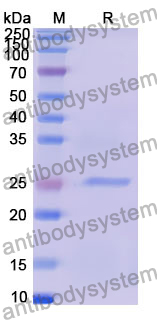Catalog No.
YHN29601
Expression system
E. coli
Species
Homo sapiens (Human)
Protein length
Val2-Ser111
Predicted molecular weight
25.07 kDa
Nature
Recombinant
Endotoxin level
Please contact with the lab for this information.
Purity
>90% as determined by SDS-PAGE.
Accession
Q8WWF6
Applications
ELISA, Immunogen, SDS-PAGE, WB, Bioactivity testing in progress
Form
Lyophilized
Storage buffer
Lyophilized from a solution in PBS pH 7.4, 0.02% NLS, 1mM EDTA, 4% Trehalose, 1% Mannitol.
Reconstitution
Reconstitute in sterile water for a stock solution. A copy of datasheet will be provided with the products, please refer to it for details.
Shipping
In general, proteins are provided as lyophilized powder/frozen liquid. They are shipped out with dry ice/blue ice unless customers require otherwise.
Stability and Storage
Use a manual defrost freezer and avoid repeated freeze thaw cycles. Store at 2 to 8°C for frequent use. Store at -20 to -80°C for twelve months from the date of receipt.
Alternative Names
HCG3, DnaJ homolog subfamily B member 3, DNAJB3
Genetic Deletion of DNAJB3 Using CRISPR-Cas9, Produced Discordant Phenotypes., PMID:37895206
DNAJB3 attenuates ER stress through direct interaction with AKT., PMID:37594932
DNAJB8 facilitates autophagic-lysosomal degradation of viral Vif protein and restricts HIV-1 virion infectivity by rescuing APOBEC3G expression in host cells., PMID:36723955
Exerkine fibronectin type-III domain-containing protein 5/irisin-enriched extracellular vesicles delay vascular ageing by increasing SIRT6 stability., PMID:35929617
Alpha lipoic acid attenuates ER stress and improves glucose uptake through DNAJB3 cochaperone., PMID:33235302
DNAJB3 attenuates metabolic stress and promotes glucose uptake by eliciting Glut4 translocation., PMID:30886231
DNAJB3/HSP-40 cochaperone improves insulin signaling and enhances glucose uptake in vitro through JNK repression., PMID:26400768
Expression of Human DNAJ (Heat Shock Protein-40) B3 in Humanized UDP-glucuronosyltransferase 1 Mice., PMID:26147428
Immunohistochemical profiling of the heat shock response in obese non-diabetic subjects revealed impaired expression of heat shock proteins in the adipose tissue., PMID:24986468
DNAJB3/HSP-40 cochaperone is downregulated in obese humans and is restored by physical exercise., PMID:23894433
Diminished reproductive potential of male mice in response to selenium-induced oxidative stress: involvement of HSP70, HSP70-2, and MSJ-1., PMID:19367646
Structure of msj-1 gene in mice and humans: a possible role in the regulation of male reproduction., PMID:18184612
MUBPy is a novel centrosome-associated protein and interacts with gamma-tubulin., PMID:17283968
Hepatocyte growth factor-regulated genes in differentiated RAW 264.7 osteoclast and undifferentiated cells., PMID:16403606
Identification of nine human-specific frameshift mutations by comparative analysis of the human and the chimpanzee genome sequences., PMID:15961456
Structure of msj-1 gene: a comparative analysis., PMID:15891074
The deubiquitinating enzyme mUBPy interacts with the sperm-specific molecular chaperone MSJ-1: the relation with the proteasome, acrosome, and centrosome in mouse male germ cells., PMID:15342353
mUBPy and MSJ-1, a deubiquitinating enzyme and a molecular chaperone specifically expressed in testis, associate with the acrosome and centrosome in mouse germ cells., PMID:12485825
Early defect in the expression of mouse sperm DNAJ 1, a member of the DNAJ/heat shock protein 40 chaperone protein family, in the spinal cord of the wobbler mouse, a murine model of motoneuronal degeneration., PMID:12182889
Mouse sperm cell-specific DnaJ first homologue: an evolutionarily conserved protein for spermiogenesis., PMID:11967194
MSJ-1, a mouse testis-specific DnaJ protein, is highly expressed in haploid male germ cells and interacts with the testis-specific heat shock protein Hsp70-2., PMID:11466217
Molecular cloning and developmental pattern of expression of MSJ-1, a new male germ cell-specific DNAJ homologue., PMID:10026944
MSJ-1, a new member of the DNAJ family of proteins, is a male germ cell-specific gene product., PMID:9521861

